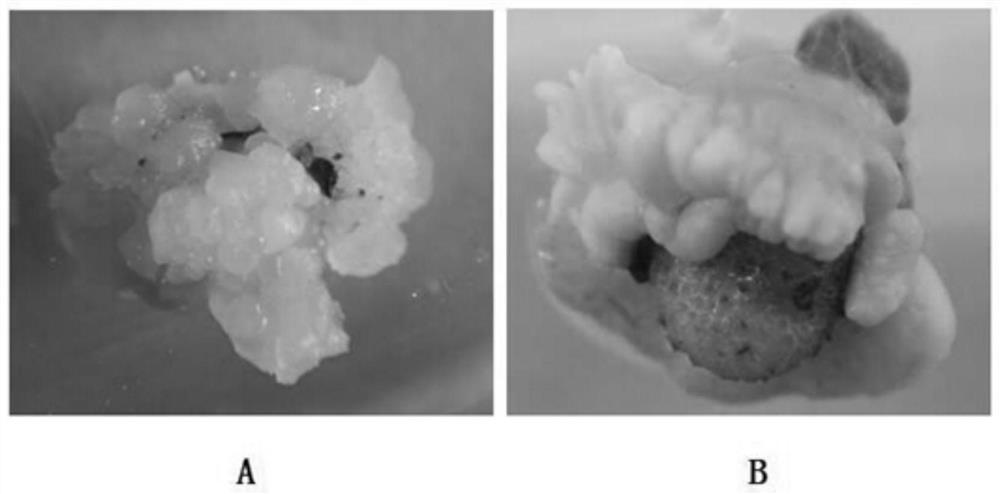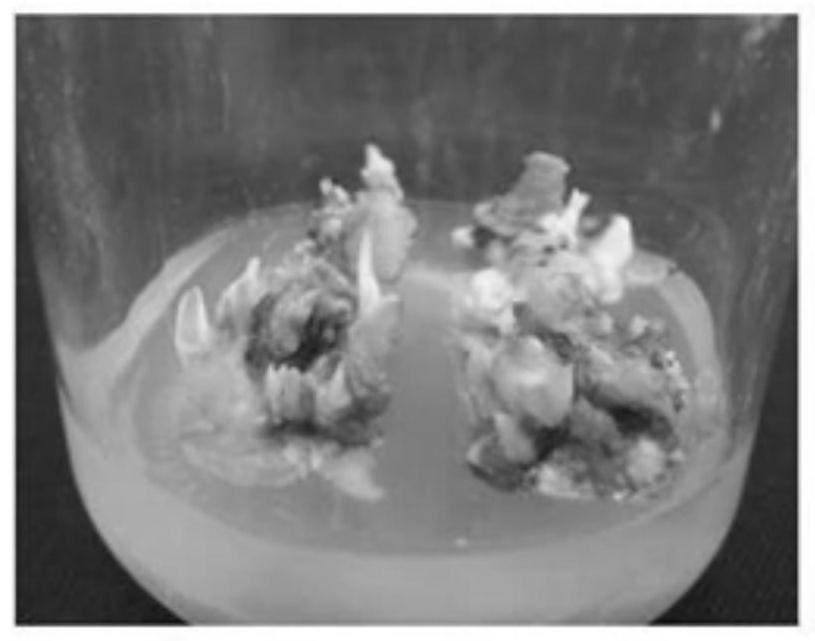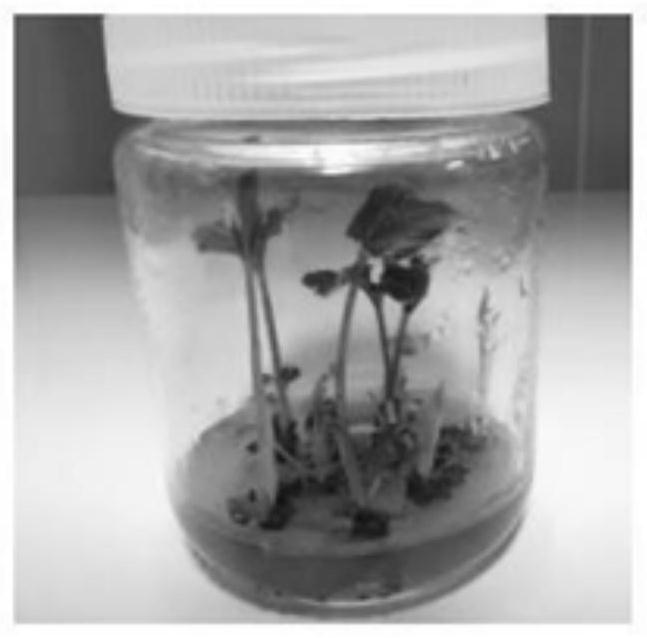Method for obtaining regenerated plants by tissue culture of flowers of Amorphophallus bulbifer (Roxb.) Blume
A technology for regenerating plants and flower organs, applied in the biological field, can solve problems such as the lack of healthy taro seeds, and achieve the effects of convenient operation, high multiplication efficiency, and low energy consumption
- Summary
- Abstract
- Description
- Claims
- Application Information
AI Technical Summary
Problems solved by technology
Method used
Image
Examples
Embodiment 1
[0026] 1. Disinfection of explants: Take the unexpanded inflorescence of Amorphophallus konjac spathe, remove the outer flower bud scales, wash the surface of the inflorescence with saturated washing powder solution, rinse with tap water 3 times, and use 75 After wiping the entire inflorescence surface 3 times evenly with % alcohol, cut the spathe and take the male bud.
[0027] 2. Callus induction: take the male buds and inoculate them into the callus induction medium, and culture them in the dark at 26°C to obtain the callus (see figure 1 A), the callus induction rate is shown in Table 1.
[0028] Callus induction medium:
[0029] Modified MS+NH 4 Cl 1100mg / L+KNO 3 2500mg / L+Ca(NO 3 ) 2 615mg / L+NaH 2 PO 4 160mg / L+MgSO 4 ·7H 2 O 370mg / L+inositol 100mg / L+niacin 0.8mg / L+pyridoxine hydrochloride 0.1mg / L+thiamine hydrochloride 5mg / L+aminoacetic acid 2.0mg / L+2,4-D1mg / L+6-BA3 mg / L+ agar 6000mg / L+ sucrose 30000mg / L+ calcium pantothenate 5mg / L+ biotin 0.05mg / L, adjust th...
Embodiment 2
[0039] 1. Disinfection of explants: Take the unexpanded inflorescence of Amorphophallus konjac spathe, remove the outer flower bud scales, wash the surface of the inflorescence with saturated washing powder solution, rinse with tap water 3 times, and use 75 After wiping the entire inflorescence surface 3 times evenly with % alcohol, cut the spathe and take the male bud.
[0040] 2. Callus induction: the male buds were inoculated into the callus induction medium, and cultured in the dark at 25°C to obtain the callus. The callus induction rate is shown in Table 1.
[0041] Callus induction medium:
[0042] Modified MS+NH 4 Cl 1000mg / L+KNO 3 2600mg / L+Ca(NO 3 ) 2 625mg / L+NaH 2 PO 4 165mg / L+MgSO 4 ·7H 2 O 360mg / L+inositol 120mg / L+niacin 0.5mg / L+pyridoxine hydrochloride 2mg / L+thiamine hydrochloride 2.5mg / L+aminoacetic acid 1.0mg / L+2,4-D 3mg / L+6-BA 2mg / L+ agar 5500mg / L+ sucrose 28000mg / L+ calcium pantothenate 3mg / L+ biotin 0.1mg / L, adjust the pH of the medium to 6.0 befo...
Embodiment 3
[0052] 1. Disinfection of explants: Take the unexpanded inflorescence of Amorphophallus konjac spathe, remove the outer flower bud scales, wash the surface of the inflorescence with saturated washing powder solution, rinse with tap water 3 times, and use 75 After wiping the entire inflorescence surface 3 times evenly with % alcohol, cut the spathe and take the male bud.
[0053] 2. Callus induction: male buds were inoculated into callus induction medium, and cultured in the dark at 28°C to obtain callus. The callus induction rate is shown in Table 1.
[0054] Callus induction medium:
[0055] Modified MS+NH 4 Cl 1000mg / L+KNO 3 2600mg / L+Ca(NO 3 ) 2 615mg / L+NaH 2 PO 4 165mg / L+MgSO 4 ·7H 2 O 375mg / L+inositol 105mg / L+niacin 0.2mg / L+pyridoxine hydrochloride 3mg / L+thiamine hydrochloride 0.5mg / L+aminoacetic acid 2.0mg / L+2,4-D 10mg / L+6-BA 1mg / L+ agar 6300mg / L+ sucrose 33000mg / L+ calcium pantothenate 1mg / L+ biotin 0.2mg / L, adjust the pH of the medium to 6.2 before steriliz...
PUM
 Login to View More
Login to View More Abstract
Description
Claims
Application Information
 Login to View More
Login to View More - R&D
- Intellectual Property
- Life Sciences
- Materials
- Tech Scout
- Unparalleled Data Quality
- Higher Quality Content
- 60% Fewer Hallucinations
Browse by: Latest US Patents, China's latest patents, Technical Efficacy Thesaurus, Application Domain, Technology Topic, Popular Technical Reports.
© 2025 PatSnap. All rights reserved.Legal|Privacy policy|Modern Slavery Act Transparency Statement|Sitemap|About US| Contact US: help@patsnap.com



